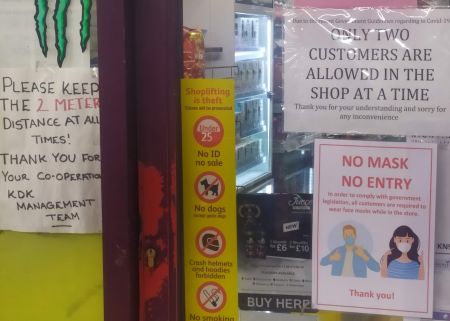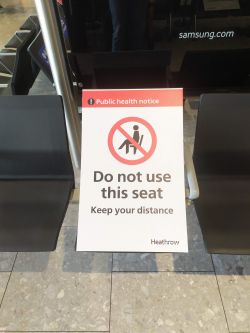Ask nicely: Difference between revisions
Amwelladmin (talk | contribs) (O) Tags: Mobile edit Mobile web edit |
Amwelladmin (talk | contribs) No edit summary |
||
| (26 intermediate revisions by the same user not shown) | |||
| Line 1: | Line 1: | ||
It | {{a|psychology|[[File:wear a mask.jpg|450px|thumb|center|You are deplorable freak and I only let you into my shop with great reluctance]]}}It doesn’t take much time listening to {{author|Dale Carnegie}}, {{author|Robert Cialdini}} or {{author|Rory Sutherland}} to grasp that ''how'' you say something can be just as important as ''what'' you say. This is hardly news: {{br|How to Win Friends and Influence People}} is 85 years old. | ||
But it | But nor does it take much time reading modern commercial contracts to know how resistant they are to the charms of persuasion. Legal drafting is habitually fastidious, over-particularised and ''logical'' at the expense of being what Sutherland calls ''psycho''-logical. | ||
By way of illustration: [[signage]]. | |||
===The [[Coronavirus]] mask example=== | |||
Say you want to ensure all your customers to wear face masks in your shop, by means of a sign.<ref>All this notwithstanding the [[JC]]’s aversion to [[signage|signs]], which are by their nature cowardly, [[passive-aggressive]] and hectoring means of influencing behaviour, but still.</ref> | |||
Now your | Now, firstly, your object here is ''not'' “to prevent bare-faced customers coming into your shop”. You could achieve ''that'' by locking the door. If ''no-one'' comes in your shop there is no point having a door or, for that matter, a shop at ''all''. Your object remains as it ever was, and always will be, twofold: | ||
*''For as many customers as possible to come in your shop'', and | |||
*''For those who do to be as well disposed towards buying from you as can be''. | |||
Your ''second-order'' object, is to comply with regulatory guidance that they all wear masks. Now some customers might think this guidance idiotic. Others might think it essential to the continued progress of ''homo sapiens'' on planet Earth. It is not the [[JC]]’s goal to rush in where [[tiresome]] angels fear to tread, so he will stay out of the debate. You should, too: people are polarised on the issue so, people on either side of the issue are your customers, don’t take a position. You don’t make the rules. ''Play the ball''. | |||
[[File:Rectal thermometer.jpg|250px|thumb|right|When it is important to be the first one to be tested]]So how do you write your sign? Consider four means of skinning the same cat: | |||
===Shockers=== | |||
====“Please do not enter without a face mask.”==== | |||
This sets up the worst possible scenario: that all customers are barred from entry, ''unless they overcome their prohibition'' by meeting certain conditions. “YOU ARE NOT REALLY WELCOME HERE,” screeches this sign, “EVEN IF YOU DO FULFIL THESE CONDITIONS”. This ''assumes'' potential customers, far from being beloved members of your extended family, welcome to sit by your hearth at any time without judgement, are TRANSGRESSORS IN NEED OF CORRECTION. Many will accept the invitation to keep walking, even if they can meet the conditions. Even if they ''are already'' meeting the conditions. Those who do enter will feel chided and will be less favorably disposed as a result. | |||
====“Please put on a face mask before entering.”==== | |||
This is bossy, and by commanding immediate corrective action, assumes every one of your customers and prospects — remember, a prospective customer is just a friend you haven’t met yet, right? — is violating yours and the nation’s basic ethical standards. It conveys the idea that a customer’s arrival is some kind of necessary evil, only tolerated reluctantly and under certain conditions. | |||
===Better=== | |||
====“Please keep your mask on when in the store.”==== | |||
This is better, assuming as it does that the prospect is already in compliance. It is not therefore chiding in nature. Nor does it impose any conditions on entry, assuming instead that the customer ''will'' enter. Cleverly, also, in presuming that prospect is ''already'' wearing a mask, it prompts those who might have “inadvertently forgotten to” to put one on ''without directly instructing it'' so, allowing a non-masked customer ''to make her own decision'' to put on a mask. But there is still a specific instruction to take a single action to the exclusion of all others. This is a direct order so, again, the customer is being commanded. ''Nobody'' puts Baby in the corner. | |||
====“Please don’t take off your mask while you’re in the store.”==== | |||
This has all the advantages of of the the example above: it presumes compliance, imposes no entry condition and lets the customer make her own decision — but it has one further advantage: it phrases the command in the negative, thereby not compelling the customer to take a single mandatory action, but rather ruling out just one course of action, but allowing the multitude of all other non-mutually exclusive possibilities. This way the customer feels maximally empowered, maximally welcomed into the shop and minimally commanded, whilst getting exactly the same message. You might further refine the message: “Feel free to enjoy yourself in the store: We ask only one thing: please don’t take off your mask.” | |||
===The social distancing seat example=== | |||
[[File:Heathrow social distancing.jpg|250px|thumb|right|That's not how you do it LHR]]A classic spotted at Heathrow during the later phases of the Coronavirus lockdown.“COME NO CLOSER, REVOLTING PERSON,” it says. “KEEP AWAY FROM ME, YOU FILTHY, DISEASE-RIDDEN FREAK”. Now it may well be that you ''are'' a filthy, disease-ridden freak. Statistically, ''someone'' in the terminal building will be, even at this late stage in the hysteria. I mean pandemic. | |||
But is that any way to talk to paying customers who, fresh from being frisked and told to remove belts, jackets and sneakers, have just slogged through seven miles of meandering pungent duty-free scrublands? How about — oooh, I don’t know, “Feel free to take a load off, either side!” | |||
{{sa}} | |||
*[[Behavioural psychology]] | |||
{{ref}} | |||
Latest revision as of 19:24, 29 December 2020
|
The psychology of legal relations
|
It doesn’t take much time listening to Dale Carnegie, Robert Cialdini or Rory Sutherland to grasp that how you say something can be just as important as what you say. This is hardly news: How to Win Friends and Influence People is 85 years old.
But nor does it take much time reading modern commercial contracts to know how resistant they are to the charms of persuasion. Legal drafting is habitually fastidious, over-particularised and logical at the expense of being what Sutherland calls psycho-logical.
By way of illustration: signage.
Say you want to ensure all your customers to wear face masks in your shop, by means of a sign.[1]
Now, firstly, your object here is not “to prevent bare-faced customers coming into your shop”. You could achieve that by locking the door. If no-one comes in your shop there is no point having a door or, for that matter, a shop at all. Your object remains as it ever was, and always will be, twofold:
- For as many customers as possible to come in your shop, and
- For those who do to be as well disposed towards buying from you as can be.
Your second-order object, is to comply with regulatory guidance that they all wear masks. Now some customers might think this guidance idiotic. Others might think it essential to the continued progress of homo sapiens on planet Earth. It is not the JC’s goal to rush in where tiresome angels fear to tread, so he will stay out of the debate. You should, too: people are polarised on the issue so, people on either side of the issue are your customers, don’t take a position. You don’t make the rules. Play the ball.
So how do you write your sign? Consider four means of skinning the same cat:
Shockers
“Please do not enter without a face mask.”
This sets up the worst possible scenario: that all customers are barred from entry, unless they overcome their prohibition by meeting certain conditions. “YOU ARE NOT REALLY WELCOME HERE,” screeches this sign, “EVEN IF YOU DO FULFIL THESE CONDITIONS”. This assumes potential customers, far from being beloved members of your extended family, welcome to sit by your hearth at any time without judgement, are TRANSGRESSORS IN NEED OF CORRECTION. Many will accept the invitation to keep walking, even if they can meet the conditions. Even if they are already meeting the conditions. Those who do enter will feel chided and will be less favorably disposed as a result.
“Please put on a face mask before entering.”
This is bossy, and by commanding immediate corrective action, assumes every one of your customers and prospects — remember, a prospective customer is just a friend you haven’t met yet, right? — is violating yours and the nation’s basic ethical standards. It conveys the idea that a customer’s arrival is some kind of necessary evil, only tolerated reluctantly and under certain conditions.
Better
“Please keep your mask on when in the store.”
This is better, assuming as it does that the prospect is already in compliance. It is not therefore chiding in nature. Nor does it impose any conditions on entry, assuming instead that the customer will enter. Cleverly, also, in presuming that prospect is already wearing a mask, it prompts those who might have “inadvertently forgotten to” to put one on without directly instructing it so, allowing a non-masked customer to make her own decision to put on a mask. But there is still a specific instruction to take a single action to the exclusion of all others. This is a direct order so, again, the customer is being commanded. Nobody puts Baby in the corner.
“Please don’t take off your mask while you’re in the store.”
This has all the advantages of of the the example above: it presumes compliance, imposes no entry condition and lets the customer make her own decision — but it has one further advantage: it phrases the command in the negative, thereby not compelling the customer to take a single mandatory action, but rather ruling out just one course of action, but allowing the multitude of all other non-mutually exclusive possibilities. This way the customer feels maximally empowered, maximally welcomed into the shop and minimally commanded, whilst getting exactly the same message. You might further refine the message: “Feel free to enjoy yourself in the store: We ask only one thing: please don’t take off your mask.”
The social distancing seat example
A classic spotted at Heathrow during the later phases of the Coronavirus lockdown.“COME NO CLOSER, REVOLTING PERSON,” it says. “KEEP AWAY FROM ME, YOU FILTHY, DISEASE-RIDDEN FREAK”. Now it may well be that you are a filthy, disease-ridden freak. Statistically, someone in the terminal building will be, even at this late stage in the hysteria. I mean pandemic.
But is that any way to talk to paying customers who, fresh from being frisked and told to remove belts, jackets and sneakers, have just slogged through seven miles of meandering pungent duty-free scrublands? How about — oooh, I don’t know, “Feel free to take a load off, either side!”
See also
References
- ↑ All this notwithstanding the JC’s aversion to signs, which are by their nature cowardly, passive-aggressive and hectoring means of influencing behaviour, but still.


